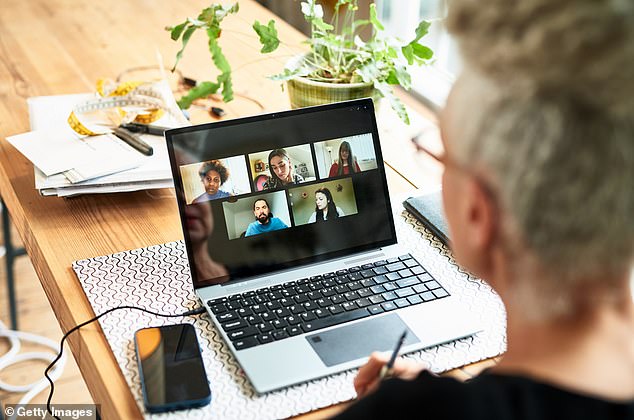Staff who enjoy the freedom of working from home may soon find that Big Brother is watching.
A growing number of companies are trialling a new method of ensuring staff stay glued to their desks – by keeping them on constant video calls all day.
The system, known as ‘body doubling’, involves two or more employees working side-by-side over Zoom or
Microsoft
Teams, often without saying a word.
The idea is that the virtual presence of a colleague makes workers less likely to slack off, gives bosses more oversight and may help reduce feelings of loneliness and isolation.
Originally developed to help children with
ADHD
focus in school, the system has been repackaged by HR departments as a tool to boost productivity and reduce feelings of isolation in the age of remote working.
But critics say the practice is intrusive and demeaning.
One employee at a company that recently introduced body doubling told
The Times
: ‘Sometimes it feels a bit much. I don’t really want someone monitoring my every move. It can feel quite Big Brother-y being watched in your own home.’
Despite the criticism, a study by the University of East London using virtual co-working platform Flown found it helped improve focus and productivity.



Alice Lang, a digital PR executive, uses body doubling twice a week and says it helps her stay on track.
‘It’s a good middle ground – I still get to work from home, but with a bit of company when I need it,’ she said.
Workplace consultant William Arruda warned the practice should remain voluntary, saying it could backfire for those who prefer working in peace.
‘Some people thrive in silence and solitude,’ he said. ‘I do think it could feel a bit uncomfortable if it were something imposed by a company. It’s nice having the flexibility to do it, or not, depending on how I’m feeling.’
It comes as business leaders blame the rise of home working for Britain’s sluggish economic recovery.
Lord Rose, former chairman of Asda, warned it has ‘set the economy back 20 years’, claiming some people have forgotten how to do ‘proper work’.
Major firms such as Amazon, JP Morgan, Sports Direct and Boots have launched a drive to ensure head office staff now have to be in the office every day. Lloyds Banking Group has threatened to cut bonuses if workers fail to make an appearance at least twice a week.
Just over a quarter of people (26 per cent) in the UK are hybrid-working, with 13 per cent fully remote and 41 per cent fully office-based.
The trend began during the pandemic in 2020 when the Government ordered millions of workers to stay at home to reduce the risk of spreading Covid-19.
As lockdown restrictions were eased, many workers enjoyed the flexibility being at home offered for childcare as well as saved time and money by not commuting.
But this has put many workers on a collision course with bosses who now want them in the office more, with some even threatening or taking strike action.
Read more











